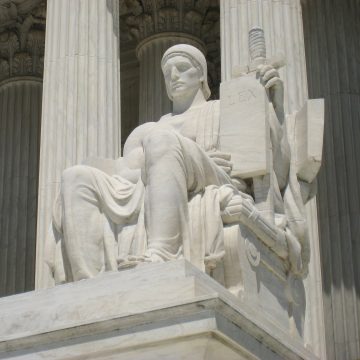
Twenty U.S. states signed an amicus brief which supports New Jersey’s sports betting case currently in front of the U.S. Supreme Court. West Virginia, led by Attorney General Patrick Morrisey, is the state that filed the sports betting brief with the SCOTUS.
West Virginia’s brief is a remarkable turn for New Jersey’s challenge to the Professional and Amateur Sports Protection Act. Only a year ago, four states signed on to West Virginia’s supporting brief to the US Third Circuit Court of Appeals, when the same case was before that court.
American Gaming Association President Geoff Freeman publicized the fact that West Virginia and New Jersey were able to recruit the attorney generals of 18 other US states to support the brief this time around. Those states believe the US federal government should leave gambling law to individual state and local authorities.
Geoff Freeman on Amicus Brief
In a press release on the AGA website, Geoff Freeman stated that, besides New Jersey and West Virginia, “Eighteen other states have joined West Virginia in filing a separate amicus brief to the US Supreme Court. This group of bipartisan states includes representation from every corner of the country, from states with and without gaming and includes signees from state AG’s offices, as well as governors’ offices.”
“It also includes the president of the National Association of AGs, both co-chairs of the NAAG gaming committee, and chair of the Conference of Western Attorneys General. Notably, it also includes the state of Utah, a state that does not have gambling, and is encouraging the federal government to get out of the way.”
Bevin, Hogan, Burgum Support New Jersey’s PASPA Challenge
Gov. Matt Bevin of Kentucky, Gov. Larry Hogan of Maryland, and Gov. Doug Burgum of North Dakota attached their names to West Virginia’s sports betting brief.
The attorney general of North Dakota also signed the filing.
Which AGs Signed the SCOTUS Sports Betting Brief?
Also, the attorney generals from 17 states signed West Virginia’s sports wagering filing: Arizona, Florida, Indiana, Kansas, Louisiana, Mississippi, Missouri, Nebraska, New Hampshire, North Dakota, Ohio, Oklahoma, Rhode Island, Tennessee, Texas, Utah, Wyoming, and West Virginia.
In most (but not all) cases, the attorney generals’ support implies the governor of a state supports the same measure. In a few instances in the past few years (Nevada, Alabama), the sitting governor and the attorney general he appointed did not see eye-to-eye on gambling issues.
Several inclusions are surprising, because of their general antipathy to gambling. The State of Texas just voted won a fantasy sports bill, while an online gambling bill is unthinkable in the Lone Star State. Yet the same Texas attorney general who unilaterally banned daily fantasy sports in 2016 signed his name to West Virginia’s filing with the Supreme Court.
Utah Signed West Virginia’s Filing
Utah has a 100%, comprehensive ban on all forms of gambling. Despite supporting no form of legal gambling whatsoever, Utah’s attorney general signed the brief supporting New Jersey’s sports betting case.
Those states are more concerned with federalism and commendeering by the federal government than the gambling issue. While the language of the SCOTUS filing is not available at present, the filing to the Third Circuit Court of Appeal by Patrick Morrisey is available. Since the same attorney general filed both briefs, the logic and wording likely are similar.
“Such Coercion Is Unconstitutional Commandeering”
In the 2016 filing to the Third Circuit Court of Appeal, Patrick Morrisey argued, “The concern of Amici States — the States of West Virginia, Arizona, Louisiana, Mississippi, and Wisconsin — is not what Congress regulates but how it does so.”
“Even where it has Article I authority to act, Congress may not force the States to act as the vehicle for implementing federal policy and thereby shift to the States political accountability for its actions. Such coercion is unconstitutional commandeering.”
As the argument goes, if the government in Washington DC can coerce the state governments on the issue of sports gambling, then it can coerce the same governments on a variety of other issues: immigration, abortion, healthcare, and a host of other issues. The states jealously guard their rights, so even states like Texas and Utah that are largely anti-gambling still oppose the federal government when it wants to set policy on sports betting. A counterpart to the PASPA could be enforced on a wide range of other topical issues.
When Will the Supreme Court Rule on Sports Betting?
Both sides presented written arguments to the US Supreme Court in August. The nine judges will read through the arguments between August and October. When the next Supreme Court session begins in October, the justices will hear oral arguments from New Jersey’s lawyers and the sports associations’ lawyers.
A ruling is expected early in 2018. A ruling could happen later in 2017, but that is unlikely. Gov. Chris Christie of New Jersey predicted, if the US Supreme Court strikes down PASPA, that Monmouth Park will have a legal sportsbook offering sports bets by the summer of 2018 — in time for the 2018 NFL regular season.















